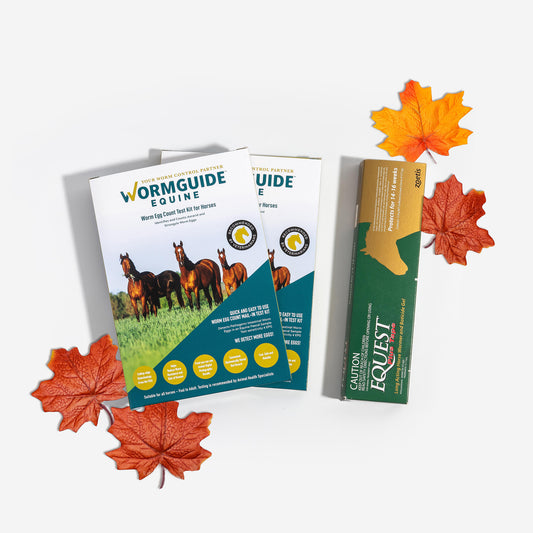Within any given herd the majority of horses always have very low faecal egg counts or even negative counts (0 eggs per gram). But typically, there are a couple of horses that always have very high worm egg counts. We call this the 20/80 rule – 20% of horses are shedding 80% of the total egg output on pasture.
Egg counts are a measure of how many eggs NOT how many worms
It doesn`t mean those high egg count horses are at risk of illness from worms. It doesn`t mean they have more worms. It does mean they are the ones responsible for the infection pressure in the herd – they are the horses that shed (pass eggs in their manure) most of the worm eggs on pasture that infect other horses.
Research has shown that horses tend to maintain their egg shedding patterns for most of their life.
The golden oldie horse
However, once horses become older or geriatric (over 20 years of age) sometimes faecal egg counts start to get higher because the immune system isn`t as good as it used to be and allows more worm eggs to be released or shed in their manure onto pasture.
The older horse can also sustain other health issues such as metabolic syndrome or an endocrine disorder such as Cushings Disease that can also affect the horse`s immunity. It has been shown that horses with these conditions will tend to have higher egg counts.
Sunny's story tells us just how valuable monitoring faecal egg counts can be in looking after our horses.
Read on to find out how faecal egg counts told Dr Charlie what Sunny is doing?
Meet Sunny

At 20 years old, Sunny lives life with 4 other horses - his pasture mates. Sunny has been diagnosed with Cushings Disease. Both age and this health issue appear to have affected Sunny`s immunity to control how many eggs each adult worm produces.
Horse worms are opportunistic troublemakers and because Sunny has an underlying health problem, he MAY be more susceptible to worm - related disease.
Sunny`s story tells us just how valuable monitoring faecal egg counts can be in looking after horses. Here are his egg count results:The pre-treatment faecal egg count result was 1900 strongyle eggs per gram (EPG). This is a high egg count.
Sunny was treated with an ivermectin dewormer.
The post-treatment faecal egg count result 2 weeks later was 0 strongyle eggs per gram (EPG).
This indicates the horse dewormer treatment was successful and killed the egg laying worms.
Eight weeks later another faecal egg count was conducted to find out if eggs have reappeared to a high level again, and the result was 956 eggs per gram (EPG).
Another high egg count result.
What is Sunny doing?
While the other horses with good immunity to worms and in good health are able to suppress the number of eggs produced in their worm burdens, it looks like Sunny`s immunity is not as good as it used to be. After two high egg counts, the pattern indicates Sunny`s natural egg shedding level has shifted from being a low egg shedder (like his pasture mates) to a high egg shedder.
More eggs = more worms
Sunny is the responsible one for the infection pressure in his herd – he is spreading most of the worm eggs on pasture where they turn into worms that reinfect Sunny and infect the other horses that graze on the same pasture.
Sunny`s deworming schedule has changed
Sunny is selected (or targeted) for a deworming schedule especially for horses that always have high egg counts (high egg shedders) to reduce the total egg output on pasture for the health of his herd. He needs more frequent deworming than the other horses.
Faecal egg counts are a vital part of worm control management to check that the deworming treatment has worked and identify the high strongyle worm egg shedders among the adult horses in a herd.
The other part is pasture management.
Less eggs = less worms
Sunny`s owner is terrific with her management of pastures to ensure her horses don`t pick up many worms in the first place. She uses best practice non-chemical methods to reduce the numbers of worm eggs and infective larvae on pasture:
- Manure removal to reduce pasture infectivity
- Alternates or co-grazes horses with alpacas. Horse worms can`t survive in ruminant animals
- Rests and rotates paddocks long enough for worms to die off.
Add to your senior horse care checklist
So, if you have an older horse like Sunny make sure you have an appropriate worm control program in place and that you regularly check the egg count level and horse dewormer treatment success using the best collection Kits and faecal egg counts available.
Many horses shift egg shedding levels as they get older, so faecal egg counts are the key to effective worm control management. To see how WormGuide can help your older horse, head to our shop and start reliable egg count testing today.
Have you got a senior horse? Send us a pic? We love our golden oldies!
WormGuide advocates talking with your vet about your horse`s test results and up-to-date worm control strategies.
Alternatively, we offer a complimentary telehealth vet consultancy service. This is a customer-only service. Specialist veterinary information and advice will only be provided for horses that have been WormGuide tested.
Dr Charlie El-Hage BVSc (HONS) MANZCVS PhD is the WormGuide veterinarian and a renowned equine vet with decades of experience working in large animal practice.










